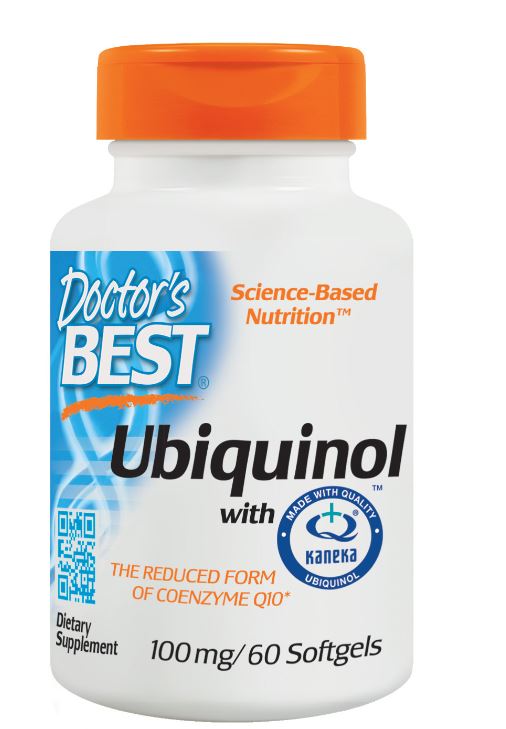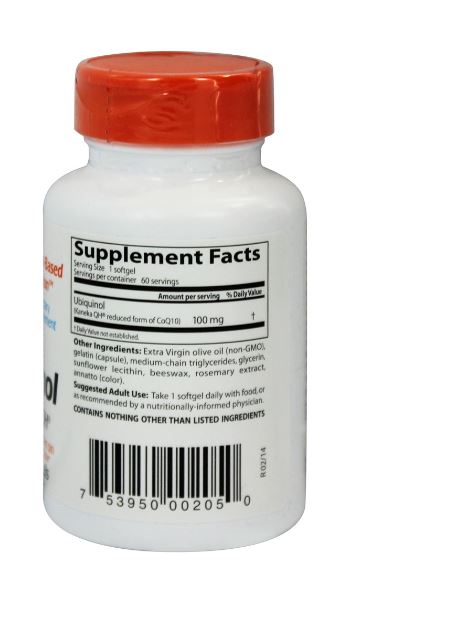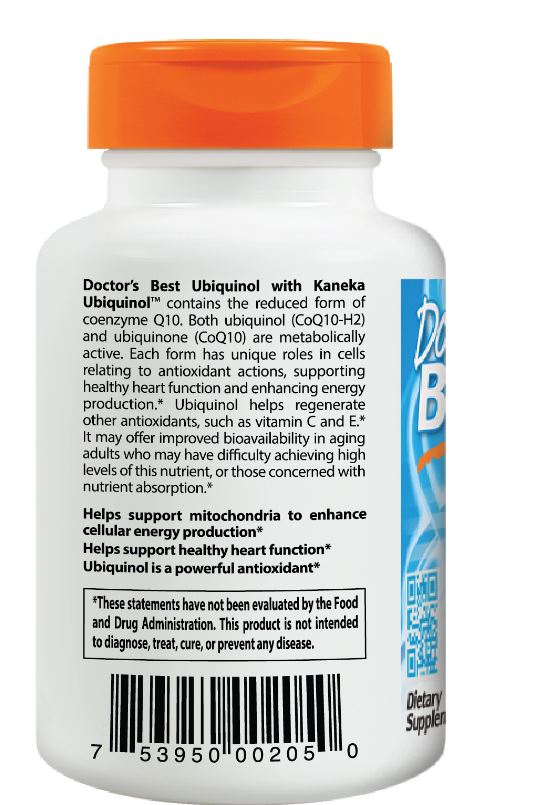Ubiquinol featuring Kaneka's QH 100 mg. - 60 Softgels Doctor's Best
Leave a review Ask a question #191076Overview
Description
Doctor's Best - Ubiquinol featuring Kaneka's QH 100 mg. - 60 Softgels
Doctors Best Best Ubiquinol featuring Kaneka's QH contains the reduced form of coenzyme Q10. Both ubiquinol (CoQ10-H) and ubiquinone (CoQ10) are metabolically active, and are found naturally in the body and in food sources. The two forms are interchangeable as the body appears to keep the reduced and oxidized forms in the "total pool" at a constant ratio. Each form has unique roles to play in cells including antioxidant actions and enhancement of energy production in the mitochondria. The commonly available supplement form of coenzyme Q10 has been the oxidized form (ubiquinone), as until recently the reduced form was difficult to manufacture due to its rapid oxidation in the air. New technology has allowed for the manufacturing of stable coenzyme Q10 in the reduced form. The results from an animal study that compared the absorption of the two different forms, as well as a human study showing significant absorption of ubiquinol, together suggest that taking ubiquinol orally may offer improved bioavailability in individuals who have difficulty achieving high levels of this nutrient, such as aging adults or those concerned with nutrient absorption. Comparison studies of the two forms are now necessary in humans to confirm this idea, as well as determine the specific circumstances under which ubiquinol may be more beneficial.Features & Benefits:
- Science-based nutrition
- Dietary supplement
- Mitochondrial support to enhance cellular energy production
- Supports healthy heart function
- Powerful antioxidant action
Ubiquinol has powerful antioxidant actions in target cells
Although ubiquinone (oxidized coenzyme Q10) and ubiquinol (reduced coenzyme Q10) are kept at a constant ratio within the body, the majority of the total coenzyme Q10 pool is made up of ubiquinol. In fact, when ubiquinone is taken orally, much of it appears to be rapidly converted into ubiquinol. Ubiquinol functions as a potent antioxidant in humans, including in low-density lipoproteins (LDLs) where it protects them from oxidative damage. The coenzyme Q10 molecule can be found in all membranes throughout cells. It appears to works in conjunction with both vitamin E and vitamin C to provide antioxidant actions throughout the body.
Coenzyme Q10 supports mitochondria to enhance cellular energy production
Coenzyme Q10, with its widespread distribution throughout the body, plays a crucial role in mitochondrial physiology as a critical member of the electron transport chain. This transport chain, which is part of cellular respiration, leads to the formation of adenosine triphosphate (ATP), our body's primary energy source. Levels of this key nutrient may decline as a healthy person ages.Animal studies have found that supplementation can restore normal levels in certain tissues , and human studies suggest that supplementing with this enzyme may have increased benefits when a person has depleted levels.
Coenzyme Q10 supports healthy heart functioning
Concentrations of coenzyme Q10 are understandably high in the heart as these muscle cells require high levels of energy to constantly function optimally. A number of studies (both animal and human) strongly suggest that coenzyme Q10 supplementation is supportive for healthy heart functioning and for maintaining cardiovascular system health.
Ubiquinol has been studied for safety and bioavailability in humans
A recently published single-blind placebo-controlled study in healthy subjects found no safety concerns in people who took Kaneka's QH ubiquinol supplement orally at doses of up to 300 milligrams daily for up to four weeks. Single oral doses of either 150 milligrams or 300 milligrams were given to fifteen healthy men and women, and standard laboratory testing (including hematology, blood chemistry, and urinalysis) as well as physical examination and electrocariography (EKG) results showed no clinically significant changes when tested two days after supplementation as compared to before the taking the supplement. In addition to the single dose study, 80 healthy volunteers were given either placebo, 90, 150 or 300 milligrams of ubiquinol each day for four weeks, and again no clinically significant differences were seen in any of the testing parameters after two and four weeks of supplementation, nor were there differences two weeks after discontinuation of the supplement. By monitoring levels in the blood, the authors found that ubiquinol was well absorbed.
Studies in several animals also reveal no concern of toxicity in doses of ubiquinol up to 200 milligrams per kilogram of body weight for up to thirteen weeks. When compared to humans, this dose level is enormously higher than the recommended doses.
Supplementation with ubiquinol appeared to be safe at even higher levels (up to 600 milligrams per kilogram body weight) in a study using a different animal. In vitro assays additionally found no safety concerns for the use of ubiquinol, as it was found to be non-mutagenic and did not cause damage to chromosomes in cells.
Suggested Use
Take one softgel daily with food, or as directed by a nutritionally informed physician.
Ingredients
| Doctor's Best - Ubiquinol featuring Kaneka's QH 100 mg - 60 Softgel | |||||||||||||||||||||||||||
|
|||||||||||||||||||||||||||
| Other Ingredients: Extra Virgin olive oil (non-GMO), gelatin (capsule), medium-chain triglycerides, glycerin, phosphatidylcholine, beeswax, rosemary extract, mixed tocopherols, annatto (color). | |||||||||||||||||||||||||||
Questions & Answers
2 Reviews
Needless to say, after a week or so I quit using. They need to be smoother and actually have the ability to dissolve.




















It works!
Recommended by a friend
trying a new brand of zinc lozenge
Good for colds etc..